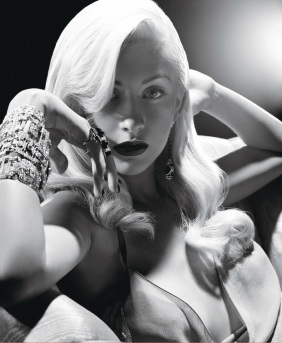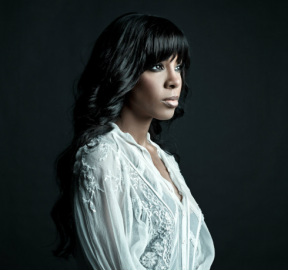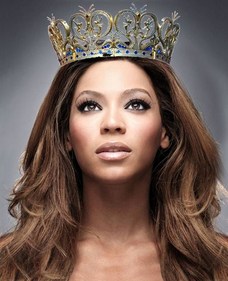 E=MC2, 2008
E=MC2, 2008 By @EddieJSays, Contributing writer
Mariah Carey’s newest single "The Art of Letting Go" (from a forthcoming album of the same title) is a beautiful 1960s-styled R&B ballad that (once more) tackles her favorite subject: being heartbroken and trying to get over it (AKA the themes of albums “The Emancipation of Mimi,” ““E=MC2,” Rainbow, etc.). A refreshing turn away from the "Doctor, I was too patient" idioms Carey spewed throughout the previous record, “Memoirs of an Imperfect Angel,” the lyrics are deep in some areas and vapid in others; it’s as if her “Butterfly” era is meeting that of “Memoirs.” Musically, there’s just an average approach, but I do commend her and Jermaine Dupri for using an orchestra, since live instrumentation was abandoned in Carey's catalogue for roughly 8 years now (sans the 2nd Christmas album). Overall, “Art” leaves little to be desired, but it does make one question why it was chosen as a single and the album title track, due to its lack of commercial appeal and easily forgettable chorus. Again, it seems Carey is forcing herself to write what she thinks people want to hear instead of just allowing things to organically grow and flourish. Vocally on “Art,” she’s in limbo between being great/decent and sounding strained and damaged. I hope that this single isn't the big highlight of her new album and that there will be much better vocals. I'm not deterred from the project yet, but I'm not hungry for more either. Mariah Carey can be defined as one of the most versatile and adaptable artists in history, both musically and vocally. These qualities are what has sustained her to a loyal worldwide audience for 2 decades, and on the flip-side, probably put her into a corner where she feels she can go nowhere else creatively. Progressively, changes in her artistic approach and image have landed Carey in stagnancy (and lower-selling music), and not only am I going to explain how that is, but I’m going to suggest how she can get out of this mess.
Mariah Carey started off with a golden and alluring girl-next-door image. Reserved but fairly open, Carey made herself identifiable as she discussed her past life in poverty, encountering racism as a biracial youth and her struggles as a burgeoning artist. This warm aura matched with her wide and powerful range, silky vocal texture and infectious songwriting lead listeners to instantly embrace Carey from her buzz-creating first major appearance at the 1990 NBA Finals (she performed “America The Beautiful”), which resulted in her first few albums selling over 23 million copies combined and making history as the first artist since the Jackson 5 to have her opening four singles top the Billboard Hot 100. In spite of all the success, Carey was miserable and felt creatively stunted. Married to then-Columbia Records CEO Tommy Mottola, the “never mix business with pleasure” rule applied, as Carey accounted that Mottola was overly possessive and controlling, strictly dictating that she never wear clothing showing any skin and that she remain home if she wasn’t working. On the final cut of the “Daydream” album, “Looking In,” she purportedly addressed her feelings of creative bondage, stating: “Well, here I am for all the pen to bleed, but they can't take my heart from me and they can't bring me to my knees; they'll never know the real me.” Taking control of her music and persona and divorcing Mottola, a liberated Carey would be heard on 1997’s “Butterfly;” an album exalted by fans for its distinctive shift in sound (more R&B & hip-hop), image (slinky, short & revealing) and quality. Record label executives generally discourage artists from making major changes, for fear that the artist will lose their niche of the market. The concern was valid as “Butterfly” didn’t sell as well as Carey’s previous 2 albums. However, Carey made Columbia $7 billion before the end of the decade.
By 1999, Mariah was a hot commodity and only knocking on 30, but she hadn’t taken a break since her career began, releasing 7 studio albums within 9 years. Between recording, tours and promotion, Carey’s voice (and body) was beginning to succumb to constant wear and tear. While her whistle, head voice and lower register remained well intact, her chest voice sounded more husky and brittle, making some of her older songs more blatantly difficult to perform. In 2001, Mariah had reached her breaking point as she left Columbia and signed an $80 million, 4-album deal with Virgin Records; the soundtrack to “Glitter” (Carey’s film debut) was the first release. Prior to the album drop, Carey was hospitalized for an emotional and mental breakdown. Intensifying matters, the “Glitter” film was panned by critics and its soundtrack only sold 501,000 units; partly because it was released the same week as the 9/11 terrorist attacks in the U.S. The next year, Virgin paid Mariah $49 million to leave and her contract was dissipated. She signed with Island Def Jam soon after with “Charmbracelet.” While the album was intended to be marketed as a “comeback,” it sold just over a million units in the U.S. with no singles touching the top 40 or even top 60, which was considered a commercial failure, given Carey’s history.









 RSS Feed
RSS Feed